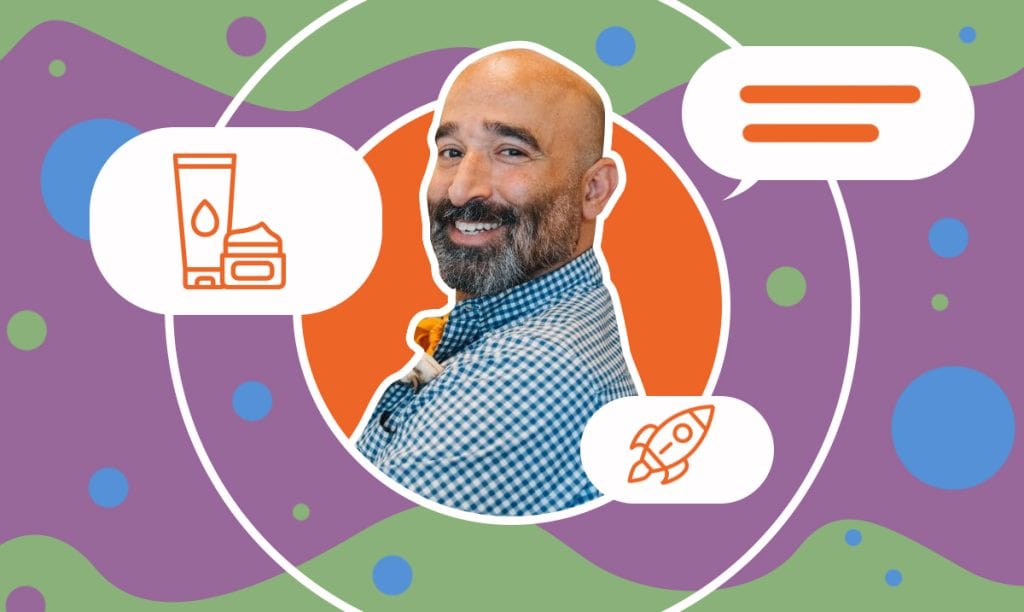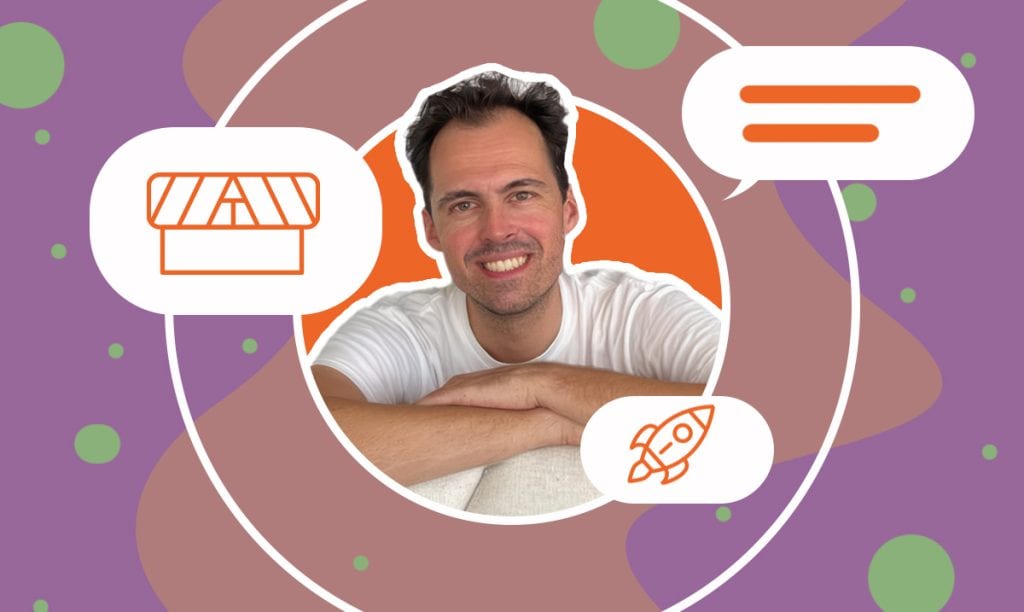Jonathan Plotzker-Kelly, founder of Heliotrope San Francisco, has spent over a decade crafting high-quality, all-natural skincare products rooted in ...
Leslie Chen’s Holistic Path to Emotional Eating Solutions
Written by: Esther Strauss
Esther is a business strategist with over 20 years of experience as an entrepreneur, executive, educator, and management advisor.
Published on April 2, 2024

Today, we’re diving into the inspiring journey of Leslie Chen, the founder of Rise Lean, a unique venture in the health and wellness sphere focusing on weight loss and emotional eating. This interview aims to shed light on the entrepreneurial spirit behind this business.
As we explore the fusion of neuroscience and traditional Asian wisdom in tackling weight management, we offer a beacon of insight for aspiring entrepreneurs looking to make a meaningful impact in the health and wellness industry.
Join us as we uncover the challenges, triumphs, and profound insights Leslie has garnered in her quest to redefine the approach to healthy living.
Origins of Rise Lean
SBS – What inspired you to start Rise Lean and focus specifically on weight loss and emotional eating?
Leslie – My own experience gave birth to a big message to share.
I came to the US from China in 2005 at the age of 19 and within one year, gained 50 pounds, with the first 30 gained in the first three months. My self-esteem fell to rock bottom as my belly ballooned up and my legs grew wider than pants after pants. To lose the initial 30 pounds, I scientifically followed all the diets I could find on Western websites and worked out in the gym daily for 2–4 hours a day. The result was not only another 20 pounds gained but also severe eating issues. I had a binge eating disorder and serious addictive thinking towards food.
Fortunately, I was back in China for summer break. Knowing I was going back made me nervous because I knew there was no way I could do any diets. By that time, I blamed myself and the lack of willpower for all my weight gain.
In China, no food has calories labeled on its package, there’s no gym nearby, and there was no chance to skip the carbs as we ate rice, noodles, buns, dumplings, and wonton multiple times per day, so I was really ready to quit weight loss efforts. I followed the local eating habits and left weight loss off my mind. A month later, I lost 14 pounds.
That shocked me.
In the meantime, it reminded me of the simple fact that I didn’t grow up doing any of these food restrictions or FAD techniques, yet I’ve always had a fit, healthy, and lean body.
I realized I really didn’t need any of that food-related overthinking.
I also realized that having food freedom and satisfaction was actually an integral part of sustainably losing weight. Most importantly, it’s your body’s instinct to self-manage and lose the excess weight as long as you allow its natural autonomy to do its work without interfering.
That is the big message I want to share. It’s not about working harder. It’s about enabling the body to do its thing.
Back to my story: I returned to the US after losing those 14 pounds. I kept eating as a “normal” person and 11 months later, I lost the remaining 36 pounds.
As soon as I realized I didn’t need to deprive myself of food to lose weight, my eating problem naturally disappeared.
Weight loss was the natural byproduct of eating really well (you unconsciously do want to) and pursuing goals outside of weight loss. Weight maintenance takes no effort just because I didn’t do anything crazy to lose the weight to begin with.
For people who have been trained to overeat, store calories, and crave the wrong food all the time, the trick really is removing these physical and psychological patterns vs. waging greater wars against your body.
If you are struggling with weight and eating problems, I’ve created a free high-quality community where I’m highly actively sharing my best insights in highly engaging ways.
Unveiling the Lean Instinct Formula
SBS – How does the Lean Instinct Formula differentiate from other weight loss programs?
Leslie – Most of the programs in weight loss focus on enforcing and creating habits as habits are considered the lever of great outcomes. That’s not wrong per se. However, most people don’t realize that good habits are the outcomes of — instead of information and willpower — organic autonomy, which naturally and automatically leads to a series of healthy behavioral choices and activities.
Example: You and I can be sitting in front of the same cake. I, the person who easily and naturally maintains health with a perfect relationship with food, am aware of it, but I’m detached, and I can easily focus on the conversation you and I are having. However, you, the person who has dieted chronically and has lots of over-reaction towards food, will spend the whole experience strategizing either resisting that cake or eating it:
- When is the next bite?
- How much can I eat?
- What’s the caloric impact?
- How many exercises do I need after?
The thoughts go on and on.
That’s only an example and one aspect of how “autonomy” works. Other aspects can be:
- Why can’t you stop eating when you should?
- Why can’t you feel satisfied when full?
- Why do you constantly think of food?
- Why are you so easily triggered by all those candies?
Two days ago, I was at the Global Health 2.0 Conference talking about a toxic relationship with food in front of 200+ health and medical practitioners. After I got off the stage, I was approached by a few physicians and one of their biggest frustrations was that their patients couldn’t stick with the weight loss plans they made for them.
The common belief was that it was a willpower and habit problem. I asked them this:
“Imagine waking up in the morning every day, and from there, there are 50 people in your head asking you to go grab that chocolate at different times of the day. How many times can you not take it?”
That question crisply states the real problem.
It’s not willpower. My clients are high-achieving people who are probably in the top 5% of diligent and committed people in their cohort, but they still suffer.
It’s not the lack of information. Oftentimes, it’s too much misinformation and over-information.
The difference is how we are wired to respond to, perceive, think of, react to, experience, sense, and process food and eating mentally, emotionally, and physically.
Habits are automatic outputs. A person is wired and poised to make the right choices mentally, physically, and emotionally. It’s just like when I’m able to stay calmly in front of the cake; it’s because I’m programmed to feel peace and detachment when I don’t need it. Habit plays no role here.
This wiring can be acquired. The beauty of it is that once it’s done, it lasts for a long time, and you see major shifts very quickly.
That’s what Lean Instinct Formula focuses on — activating autonomy that naturally delivers a liberating, satisfying relationship with food while making weight loss inevitable.
The Neuroscience Connection
SBS – What role does neuroscience play in your approach to weight loss?
Leslie – Your brain controls everything — from your mindset, attitude, senses, behaviors, cognitive abilities, decisions, emotions, cravings, etc. If your brain signals sugar cravings, you can’t fight it and to be successful in any area of life, you need to get your brain on board.
One distinction about weight loss is that it’s a natural byproduct of your brain and body working for you.
Tailored Coaching Strategies
SBS – How do you personalize your coaching to cater to individual needs and challenges?
Leslie – I’ve been in this industry long enough to know where individual challenges overlap so I can build my program in the way that covers most of them.
In my flagship coaching program, we have group calls designed to not only facilitate deep reconditioning work and maximize synergy and confidence but also provide everyone an opportunity asks questions with great support.
Success Stories
SBS – Can you share a success story that particularly stands out to you?
Leslie – I’ll share two because each will tell one major aspect of the transformation.
Jennifer, a client of mine struggling with obesity for 30 years now, was able to see automatic weight loss consistently throughout the program. She had Type 1 diabetes and lost her cycle for six years before she started. Through using the Lean Instinct Formula, not only did she consistently lose 1–2 pounds per week without trying, but she also got her cycle back and her blood sugar, for the first time in many years, got back to normal range.
Valarie, a client who struggled with binge eating for 27 years, had a total recovery and shifted her entire experience with food halfway through the program.
I’m using these two examples because they show different sides of the experience — one is about weight loss, and the other is about food addiction.
However, they are really two sides of the same coin. As I mentioned earlier, as soon as you start experiencing how food freedom and satisfaction contribute to your well-being and weight loss journey, the downstream problems created by lack of this belief will be gone almost immediately.
Long-Term Weight Loss Sustainability
SBS – How do you ensure that the weight loss achieved by your clients is sustainable in the long term?
Leslie – We have multiple post-graduation follow-up calls with our clients as a part of the program offer.
Most importantly, when you lose weight without trying and have great habits automatically built into your lifestyle, and when your body and psychological inner wiring is done to facilitate the changes when you don’t need to fight, you know you are forever transformed.
Debunking Weight Loss Myths
SBS – What are some common misconceptions about weight loss that you often encounter?
Leslie – I work with a global audience and clientele, so I sometimes involuntarily make comparisons among people of different regions.
For American people, it’s extremely hard to believe they can achieve weight loss while being free around food — due to many years of programming. If you can’t believe it, you can’t make it.
To believe it is simple: Look at people in other countries and regions — Spain, Italy, Japan, South Korea, Vietnam, etc. — where people are eating liberally, living long lives, and keeping fit without being obsessed with dieting. Then, you may get a sense of why I always say it’s your body’s instinct to regulate eating, body weight, and health if you stop interfering with it.
Other misconceptions include CICO and accountability as keys to losing weight.
Within the the Lean Instinct Formula, we never mention accountability. This is because when your physical, psychological, and emotional programs are reset to lose weight and enable mostly the great habits instead of. the bad ones, accountability is irrelevant.
CICO is the same. You don’t need to count seconds of your breath to make sure you don’t overly inhale oxygen, why would you need to count calories to begin with? Eating just the right amount of food is self-regulated when you’ve reset your programming.
As I said earlier, it’s not accountability or discipline; it’s self-regulated autonomy by the body which, once fully unleashed, brings you the result for its best survival interest.
Another phenomenon I have a problem with is ketogenic. When I first came to the US, I read the diet literature online and was so confused because growing up in China, we ate rice, dumplings, wontons, noodles, and buns every day for 2–3 meals and never struggled with weight. I did Atkins myself to lose the initial 30 pounds I gained in the US, couldn’t sustain it. The result was putting on an extra 20 pounds. My 50 pounds were gone organically after I stopped not only keto but all American restrictive diets and regimens and fell back to how I used to eat growing up with a lot of satisfaction and liberty. I dropped the weight effortlessly. I’ve also maintained effortlessly for 18 years now.
Keto may work for some people, but I wouldn’t call it necessary just for weight loss.
Tackling Emotional Eating
SBS – How do you address emotional eating and its underlying causes in your program?
Leslie – This will require a holistic brain-body-behavioral approach.
Let’s look at why you have emotional eating problems first and here are the common reasons:
- You have a belief that food is your enemy, and in order to fix your weight, restricting food is a must
- The belief above has created constant self-deprivation behavior. The more you deprive yourself, the more you want the food
- Growing up, you’ve created an association between emotional events (often negative) and eating certain foods. This association has evolved into a full-fledged programming that makes you seek comfort in food
- Your body’s inner system triggers you to want sweets more than you should. This can happen for different reasons, and the most interesting one I’ve seen in almost all my American clients is the severely distorted sense of the sweet flavor. For instance, around week five of Lean Instinct Formula, my clients unanimously realized that what they used to call normal sweet is so overly sweet that their bodies cannot take it (check out the “Nightstand Exercise” experience on my weight loss coaching details).
In this experience, their body now starts wanting to avoid it vs. wanting it just because of this one single shift. This is how many of them ended their year-long sugar addiction — not due to willpower at all, but the body’s natural resistance against the chocolate truffle that used to be their biggest addiction.
So, at Lean Instinct Formula, there are three components of the training that help people completely remove their emotional eating and self-control problems.
First, teaching clients how to eat just like a normal person, without food restriction, in a simple, stress-free way while losing weight. This experience alone can change their world because now they’ve seen a different reality that they couldn’t even believe. However, they know intellectually that it could be real for them because when they look around or look at other cultures, it’s what happens all the time.
Having such an experience immediately removes #1 and #2 barriers above because now the experience is so real that the past limiting beliefs in food restriction are naturally removed.
When people no longer feel the need to deprive themselves, they no longer have a scarcity mindset about food, and that removes excessive desires for food.
Second, a sensory reset needs to happen.
In this part, shift physical patterns, for instance:
- Their sense of satiety is tuned in to make them stop eating automatically when satisfied
- Their sense of food flavors and textures is restored so that they no longer have distorted experiences with certain things, say sugar, and blindly fall for them
Third, psychological shifts automatically generate the desired behavioral changes.
It’s, in fact, an organic process. Right now, you see yourself only wanting to eat the right thing in the right amount. You’ve lost attachment to food and you’ve also lost weight. You are given plenty of food freedom and standing in front of the whole pantry of snacks, you no longer feel cravings. Now you’ve realized you really can be free, and your body can really work for you.
The psychological shift also mirrors an emotional shift from being insecure to feeling safe and relaxed in front of food.
The whole journey of removing emotional eating, instead of enforcing rules and removing triggers, is through stopping being controlling.
How do you do that? By having your routine, body, and mind work for you spontaneously and interactively.
Entrepreneurial Challenges and Triumphs
SBS – What challenges have you faced in growing your business, and how have you overcome them?
Leslie – My biggest challenge is that in the US, people are so wired to think and live like dieters, even if they hate it.
Many of them can’t even fathom doing the most basic thing we human beings are able to do by default — which is living their life without food being a theme — whereas I’m here telling them they can lead a life where both weight and food freedom are non-issues.
Here’s how I overcome it:
Repeating my message again, again, and again with full faith and authenticity because:
- For people who are ready to embrace the idea, it changes their life
- As more people achieve success through it, more will start listening, and gradually, it builds awareness and momentum
That was the biggest challenge when I first started out and things have only become easier and easier.
So far, I’ve had the pleasure of working with high-achievers who were ready to not only stop missing out on life but also naturally attract more health and happiness. I’ve also worked with physicians, psychiatrists, therapists, entrepreneurs, scientists, neuroscientists, corporate athletes and leaders, etc. I can see the more passionate and persistent I am towards my purpose, the better the market responds.
Advice for Aspiring Health and Wellness Entrepreneurs
SBS – What advice would you give to entrepreneurs looking to start a business in the health and wellness industry?
Leslie – The following two have been my motto for many years:
“Lifting up humankind is the master sport of business that the top 5% play.”
“You don’t have to be great to start, but you have to start to be great.”
The first one helps me focus on my mission and reconnect to the deep meaning and purpose of my work.
The second one constantly plugs me into a growth mindset.
If you are just starting out, you’ll meet a lot of challenges for sure. Set your standards high, and be willing to invest in yourself — mindset, expertise, skillset— for the long run.
Also, it’s a market full of fluff and noise. It means a great opportunity for you because all you need to do to stand out is be authentic and provide high-quality service.
Integrating Asian Wisdom
SBS – How do you integrate traditional Asian body-transforming wisdom into your coaching methods?
Leslie – First, the entire business was inspired by my experience in Asia. That translates into the piece where I teach people how to live and eat in a simple, stress-free, and satisfying way while losing weight.
Secondly, Asian philosophy has been the backbone of the design of many experiences included in the program. For instance, Taoist thinking such as “what you resist persists” (referring to cravings) and a whole new mindset approach that creates perfect, automated self-control.
Measuring Program Success
SBS – How do you measure the success of your program, both for your business and for your clients?
Leslie – Here’s how client success is measured:
Within the program, there are plenty of touch points to measure in every module. It also tells me where my clients need further support so that I can jump right in.
Also, up until this year (2024), we’ve been having post-program follow-up with graduates multiple times per year.
For my business, its success is measured through the following components with the following weight ratio:
- Client success: 50%
- Team success: 25%
- My happiness: 25%
I believe in building win-win-win relationships. If we all win, it’s a success.
Future Visions for Rise Lean
SBS – What future plans or developments do you have in mind for Rise Lean?
Leslie – There are a few things I can see right now:
- Serving more driven individuals who believe they deserve better well-being and are determined to achieve it
- Working with businesses and corporations to create a successful product and experience as part of their employee reward system. The problem I solve is highly prevalent and implies lots of stigma among the employees. However, most of the products on the market don’t solve the problem in a fundamental and transformational way. According to Global Data, this problem has cost US businesses and companies $425.5 billion in economic loss in 2023. I would love to speak to any company representatives about how we can create a more energetic, productive, and healthier workforce
- Working with physicians, potentially. After I presented my solution at the Global Health 2.0 Conference in Las Vegas this year in front of 200+ medical professionals, I was approached by physicians who help patients lose weight
There’s an obvious opportunity that my solution can help them enhance their patient’s results. For instance, if the patient is struggling with food addiction, constant craving triggers, and emotional eating problems, they won’t be able to follow the doctor’s plan consistently and failure is the default result, and it can be frustrating to both the patient and the doctor.
This gap is exactly what the Lean Instinct Formula fills. By shifting how people perceive, experience, and respond to food and eating, we can effectively remove the barrier and create a very positive experience, especially for patients. I’m happy to speak to physicians who are interested in incorporating cutting-edge neuroscience methodologies into their solutions.
Subscribe to Our Newsletter
and gain insider access to cutting-edge business insights and trends.
Featured Resources

How a Retail Pro Turned Skin Sensitivity Into a Skincare Brand
Published on April 3, 2025
Read Now

How AirTulip Improves Sleep Quality and Eases Allergies with Clean Air
Published on February 27, 2025
Imagine waking up feeling truly refreshed, breathing air that is 1,000 times cleaner than what traditional purifiers can offer. That’s the promise ...
Read Now

How Lin Mezori Is Transforming the Recovery Industry
Published on January 2, 2025
Lin Mezori, the matriarch behind Pure Recovery, has transformed the wellness and recovery space with her vision of blending innovative therapies and ...
Read Now
Comments